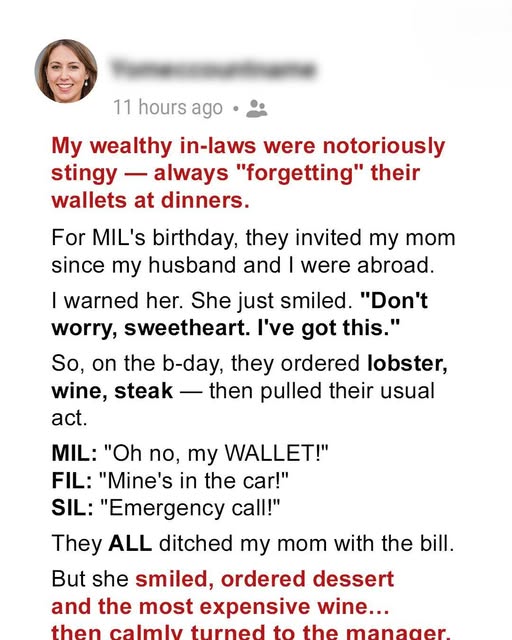
My in-laws were the kind of people who never missed a chance to boast about their wealth — yet somehow always managed to “forget” their wallets when it came time to pay.
Every dinner out turned into the same routine. They ordered the most expensive dishes, talked about their luxury vacations, and then suddenly realized they had “forgotten” something important. My husband and I had covered for them more times than I could count.
So, when my mother-in-law invited my mom to her birthday dinner while my husband and I were abroad, I immediately felt a twinge of worry.
I warned my mom.
“Mom, they do this thing where they pretend they forgot their wallets. Just… be prepared, okay?”
She smiled — that calm, confident smile I’d seen a thousand times before. “Don’t worry, sweetheart. I’ve got this.”
The Dinner Setup
On the evening of the birthday dinner, my in-laws chose one of the most expensive restaurants in town — the kind with soft lighting, gold-rimmed plates, and menus that didn’t bother listing prices.
According to my mom, everything started out pleasant enough. They toasted with glasses of red wine, complimented her on her “graceful manners,” and ordered without restraint — lobster tails, prime steak, imported wines, and the restaurant’s signature desserts.
When it was time for the check, the waiter placed the elegant black folder on the table. My mom said she knew exactly what was coming the moment she saw the subtle glance my mother-in-law exchanged with her husband.
Then, right on cue, the performance began.
MIL: “Oh no, my wallet! I must’ve left it in my other purse!”
FIL: “Mine’s in the car. I’ll be right back.”
SIL: “Oh, I just got a call from work — I have to step outside!”
And, just like that, one by one, they disappeared.
The Moment of Truth
My mom sat quietly at the table, sipping the last of her wine as the waiter returned. The dining room had grown quieter, the soft hum of jazz music filling the air.
The waiter smiled politely and said, “Ma’am, will you be covering the bill?”
Without missing a beat, my mom smiled back and said, “Yes, of course. Could you please bring the dessert menu again? I’d like to order a few more things to take home.”
The waiter nodded, slightly surprised, but happy to oblige.
When the desserts arrived — chocolate soufflé, crème brûlée, and cheesecake — she ordered one of each. Then she added, “Oh, and another bottle of your most expensive wine. My friends will appreciate it.”
By now, my in-laws had been gone for nearly twenty minutes.
My mom calmly asked for the manager.
The Twist They Didn’t See Coming
When the manager arrived, she explained the situation in her composed, kind tone.
“My dinner companions seem to have stepped out for a bit and haven’t returned. I believe they may have accidentally forgotten to settle their portion of the bill. Here’s what I’d like to do — could you please charge everything to their regular reservation name? They’re frequent guests here.”
The manager nodded, immediately recognizing their names. “Yes, of course, ma’am. They have an account with us.”
Apparently, my in-laws often dined there and had a line of credit with the restaurant. The manager smiled apologetically and said, “We’ll take care of this, ma’am. You don’t need to worry.”
My mom thanked him warmly, signed for her portion — just her glass of wine and the extra desserts she ordered — and left a generous tip for the waiter.
The Aftermath
The next day, my phone buzzed with a call from my mother-in-law. I could hear the irritation in her voice before she even said hello.
“Your mother embarrassed us last night!” she snapped. “She told the restaurant to charge everything to us. Do you know how humiliating that was?”
I couldn’t help but laugh. “Wait — didn’t you say you forgot your wallet?”
There was a long pause. Then, she muttered, “That’s not the point!” and hung up.
Later, my mom called me, her voice full of amusement. “They might not invite me again, but I think I taught them a little lesson in responsibility.”
The Lesson That Stuck
When my husband came home and heard the story, he couldn’t stop laughing either. “Honestly,” he said, “your mom handled it better than either of us ever did.”
And she really had. She hadn’t yelled, argued, or made a scene. She’d simply turned the situation around with class and calm intelligence.
A week later, I heard from one of my sisters-in-law that their parents were still fuming about it — but they’d also quietly stopped pulling the “forgot my wallet” stunt. Apparently, the embarrassment of having the restaurant manager remind them of their unpaid bill had been enough to end the habit.
Since then, family dinners have changed. Everyone pays for their own meal. Sometimes, my in-laws even offer to cover the tip.
A Small Act, A Big Message
What my mom did wasn’t about revenge. It was about respect — showing that kindness doesn’t mean being taken advantage of.
She didn’t confront them or stoop to their level. Instead, she showed them how dignity and intelligence can do more than anger ever could.
The story became a favorite among our friends and family — a reminder that sometimes, the best way to deal with unfair people isn’t by fighting fire with fire, but by holding up a mirror and letting them see their reflection.
That night, my mom didn’t just pay for dinner. She delivered a quiet but powerful message — one that echoed louder than any argument ever could:
If you can afford to take advantage of others, you can certainly afford the bill.
And from that day forward, no one ever “forgot” their wallet again.



